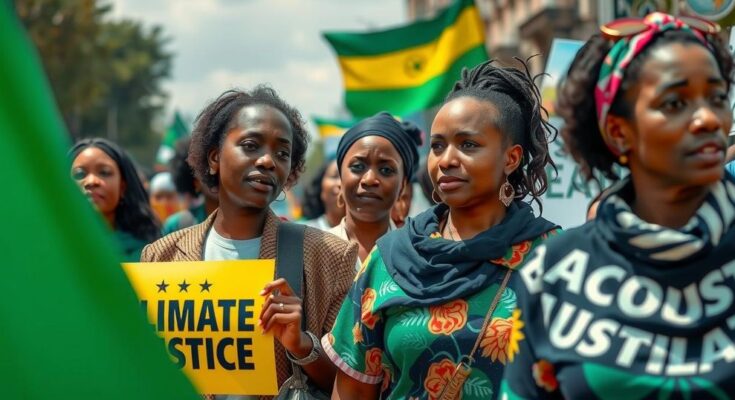On Saturday, Senegalese women marched in Dakar to demand climate justice, urging polluting countries to reduce greenhouse gas emissions ahead of COP29. Activists highlighted the local impacts of climate change, including significant flooding and displacement, while calling for accountability from wealthy nations. The march emphasized the need for adherence to the Paris Agreement and the necessity to protect vulnerable communities against environmental degradation.
On Saturday, approximately 50 Senegalese women gathered in Dakar to advocate for climate justice, emphasizing their demands for a reduction in greenhouse gas emissions from what they term “polluting countries.” This march, which has occurred annually since 2021, is particularly significant this year as it precedes the 2024 UN Climate Change Conference (COP29) scheduled for November 11. Marchers expressed their dissatisfaction with the lack of progress over the past four years, chanting slogans including “Down with capitalism! Down with polluting countries!” while carrying banners that urged the protection of Senegal’s natural resources and a transition towards a decarbonized future. Cheikh Niange Faye, a former tour guide from Senegal’s Thiès region, highlighted the urgent need for change, stating, “It’s been four years that we’ve been marching, and nothing’s changed. They’re spending billions to do their conferences, but they owe us billions in compensation.” He pointed to the significant impact of climate change on rural communities, particularly in light of the severe flooding experienced recently in the Sahel region, which has devastated agricultural areas and displaced tens of thousands. Activists argue that the nations contributing the most to greenhouse gas emissions have a moral obligation to support Africa, which is disproportionately affected by climate-related disasters despite contributing only 3.8% of global emissions, according to the Carbon Disclosure Project. Khady Camara, a prominent activist and organizer of the women’s climate march, affirmed the necessity of adhering to the Paris Agreement in the lead-up to COP29. Additionally, Khady Faye, an environmental activist from the Saloum Delta region, called for preservation of the impacted communities, particularly against threats such as coastal erosion and the new offshore drilling project at Sangomar oil fields, overseen by Woodside Energy. She urged, “Think about the suffering of these communities, think about the suffering of these women. Try to leave our delta alone, try to leave the gas at Sangomar underground, to let the community live normally.”
The growing climate crisis has prompted various global movements advocating for climate justice, particularly in regions most affected by climate change. Senegal, located in West Africa, has experienced significant climate-related challenges, including severe flooding and coastal erosion, impacting agricultural productivity and threatening livelihoods. As countries prepare for international summits like COP29, communities often argue that wealthier nations, which are historically responsible for higher emissions, should provide reparations and support to vulnerable regions. The grassroots movement, particularly among women, is crucial as they often bear the brunt of environmental degradation, balancing familial responsibilities amidst changing climates.
The march held by Senegalese women underscores the urgent call for climate justice and accountability from nations that contribute disproportionately to greenhouse gas emissions. Their powerful testimonials and demands highlight the need for immediate action to address the impacts of climate change, particularly in vulnerable communities. As Senegal prepares for COP29, the voices of these activists serve as a poignant reminder of the inequities in the global response to climate change and the necessity for systemic change to protect the planet and its people.
Original Source: abcnews.go.com




